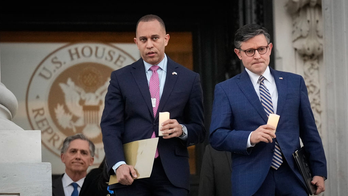The Senate remains in legislative limbo Thursday with its eyes locked squarely on the House and Speaker John Boehner's ability to get his debt ceiling bill passed.
While that plays out, the main topic of discussions, which continue between leaders of both chambers behind closed doors, is how to iron out details between differing Senate and House plans and get a bill to President Obama's desk by deadline day - Tuesday.
But don't expect to hear a peep about that from Senate today, as everyone is giving Boehner the room he needs to get this bill through a conservative House.
Senate Minority Leader Mitch McConnell is known to talk to Vice President Joe Biden from time to time, but the leader's office says they are not negotiating a deal. Still, White House officials are involved in the closed-door talks.
Rank-and-file Senate members will most likely give their take on the negotiations throughout the day, but no one except for the top Congressional leaders and White House officials know what's really going on.
There are a couple of things that might happen on this side of the Hill today after the House finishes the awaited floor action:
The Unlikely Path
Obama caves and embraces the Boehner plan as is. He asks the Senate to accept the bill for the good of the country, and enough senators jump on board for passage. Obama has it by the weekend.This is extremely unlikely, though.
The Most Procedurally Advantageous Path
This is the path leadership aides think is most likely right now. The Boehner bill comes over Thursday night in a form that carries certain privileges in the Senate, namely -- it can't be filibustered at the start of debate (it can be filibustered at the end, before final passage, so Reid needs a coalition of 60 for success no matter what).
Reid calls it up the bill tonight and immediately files cloture on it to get to final passage. He might also reveal a compromise product that would take the form of an amendment ---- one that would serve as a substitute for the entire Boehner bill. It likely would bear a strong resemblance to the Boehner bill, however. Reid must file cloture on that amendment, as well.
There's a chance that this compromise amendment might not be unveiled tonight. Reid could wait until Friday or Saturday. But Whenever he unveils it, he must file cloture on it ASAP.
Whatever Reid files cloture on tonight, it gets a cloture vote Saturday morning, even if it's both the Boehner bill and the substitute amendment.
Saturday morning cloture vote(s) need 60 votes to win to get to final passage.
The cloture vote(s) triggers a 30-hour clock before final passage can occur; for example, if a cloture vote happens at 7am ET Saturday, final passage won't happen until 1pm Sunday.
But, if the leaders can get all 100 senators to agree, the final passage vote can occur earlier, even the same day (the reasoning is if the leaders can show they have 60 votes, they'll easily get 51 for final passage).
If Reid can't file cloture on a compromise product until Saturday things get a whole lot trickier. That would mean a Monday cloture vote and all 100 senators would then have to agree to hold the final passage vote the same day. Stranger things have happened.
This scenario gives the House almost no time to act before the Tuesday deadline. Not to mention, the compromise product would likely have to have a different coalition of supporters in the House -- one with more Democrats. It's a very delicate balancing act.
The More Difficult Path
This scenario means Reid tables the Boehner bill Thursday night and needs 51 votes to do it. He files cloture immediately on his own bill (maybe w/ some changes to get GOPers on board), but it's cloture to start debate (called "cloture on the motion to proceed).
That means a Saturday cloture vote. Reid needs 60 votes to win to START debt.
Reid then immediately files cloture, again, this time to get to final passage.
That cloture vote happens Monday, and he would have to hope all 100 senators agree to allow final passage the same day.
That means Boehner would be dealing with an entirely new bill. That's some tough stuff.
The bottom line is the House and Senate are most definitely running out of time. But, they can always either get an agreement to hold votes earlier or they can ram through a very short-term debt ceiling increase to buy a bit more time.




